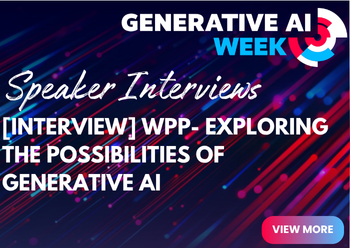Speaker Interviews

Interview with Sabrina Shih, AI Policy Integration Lead at Responsible AI Institute
Responsible AI in Generative AI
Challenges, Strategies, and Emerging Regulations This session will explore responsible AI approaches for defining and managing Generative AI use cases, focusing on balancing organizational efficiency with system suitability. Key topics include aligning GenAI strategies with Responsible AI principles, addressing emerging regulatory requirements, and overcoming challenges in system risk management.

Interview with Kevin Chung, CSO at Writer - Enterprise Generative AI in Action
Hear exclusive insights and success stories with Kevin Chung CSO at Writer
Delve into exclusive insight from Kevin Chung, Chief Strategy Officer at Writer, as he shares his journey and experiences at Writer. Gain an insider’s perspective on AI's role in the future of work, balancing innovation and risk, driving adoption, the challenges and opportunities ahead, and how organizations can prepare for an AI-driven future.
>> Get your complimentary copy now

Interview with Anuj Bindal GM and Director, Visual Shopping, Amazon
In this conversation, we hear from Anuj Bindal, the General Manager and Director of Visual Shopping at Amazon, as he shares insights into Amazon's journey with Generative AI.

Interview with Coca Cola - Harnessing the Power of Generative AI
There is a worldwide wave of excitement around the revolutionary potential of generative AI. Khalil Maaouni, head of data and digital at Coca-Cola Bottlers Japan – is at the cutting edge of both those topics. Download interview here >>>

Interview with WPP - Exploring the Possibilities of Generative AI
Among the world’s foremost AI experts speaking at the event will be Daniel Hulme, Chief AI Officer at WPP. Hulme has a quarter of a century’s worth of experience in AI within academia. Download the interview here >>>

Interview with Booking.com and their Decision to Integrate Generative AI into their Products
Booking.com are an example of a business that have already rolled out a customer facing product with Generative AI at its core, the AI Trip Planner. The planner incorporates the benefits of LLM’s with the value of their internal data, to deliver a differentiated product in the travel market. Read interview here.

Interview with Chris Booth, AI consultant and product owner for NatWest Group’s artificially intelligent agent: Cora
The media crescendo surrounding generative AI has reached such a pitch in recent months that it’s difficult to ascertain genuine insight from all the noise. This means it’s more important than ever to go directly to the experts working at the cutting edge to discover the true significance of the latest developments.
Well, the expert opinion is in: believe the hype, because “there’s a big change coming”.
That’s the view of Chris Booth, generative and conversational AI consultant and product owner for NatWest Group’s artificially intelligent agent: Cora.

